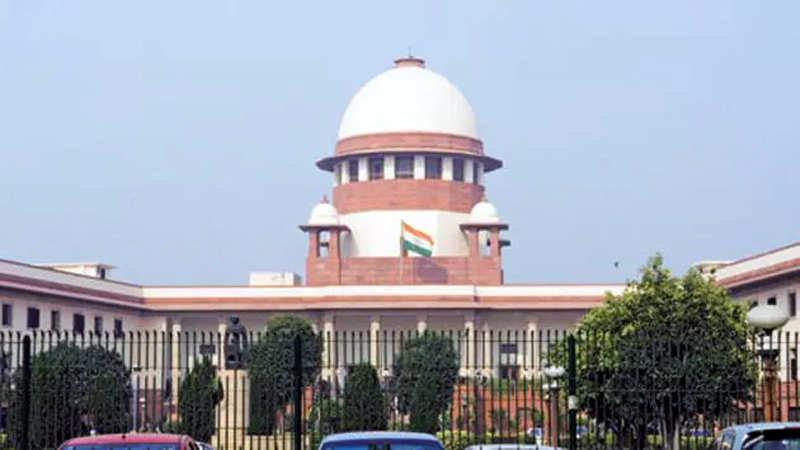‘HC correctly followed settled law’
Excelsior Correspondent
JAMMU, June 28: The Supreme Court has upheld the order of the Jammu & Kashmir and Ladakh High Court that inter-se seniority for Munsiffs appointed by way of direct recruitment on the recommendation of the J&K Public Service Commission is to be determined on the basis of their inter-se merit at the time of selection and not roster points.
Refusing to interfere with the order of the High Court, the Apex Court noted – “The High Court vide impugned judgment relying upon the settled principles, has ruled that such seniority should be determined on the basis of merit on which the candidates were selected by the Public Service Commission as roster points are not meant to assign seniority. In our considered view, the High Court has correctly followed the settled law.”
As Senior Advocate, Ranjit Kumar appearing on behalf of the appellant, vehemently argued that without any fault of theirs, one whole batch of Munsiffs were suffering because of subsequent change in Rules introduced by the High Court, a Bench comprising Justices Surya Kant and J.B. Pardiwala acknowledged it by stating – “We are not blaming you, the mistake was committed by the High Court on its administrative side. You are good officers, our good wishes are with you.”
It added, “they are judicial officers and to be honest we don’t want any uncertainty in their career. Let the seniority issue be settled and they can work peacefully. The temporary hardship may be caused to X, Y, Z, but that would eventually completely settle down the uncertainty in seniority.”
Kumar apprised the Bench that as per the past practice of the High Court, roster point was considered to determine inter-se seniority. In 2005 by way of revised Rules it was based on merit. He clarified that the appointment of the concerned officers were made before the Reservation Rules of 2005 came into existence. It was added that the High Court had admitted these facts in their affidavit.
Justice Kant succinctly elucidated that it is settled law that seniority is to be determined on the basis of merit and not roster. Roster point is meant to ensure the representation of the reserved categories. He also noted that even if a practice as put forth by Kumar was prevalent in J&K High Court, it was in derogation of the trite law.
“Assuming there was a practice in the High Court determining seniority on the basis of roster points, such a practice was palpably illegal. After RK Sabharwal how could it have been done?…Roster points for seniority have never been recognised. Consistently the court has been against it.”
After a thorough discussion on the Rules and practices of the High Court, at the request of the Senior Advocate, the Bench recorded – “We are satisfied that even in absence of 2005 Rules, the High Court was obligated to determine the seniority on the basis of the inter-se merit of the candidates at the time of their selection by the J&K Public Service Commission.”
Last year, the Madras High Court had ruled that the seniority of Judicial Officers must be fixed on the basis of inter-se merit in the competitive exam and not on the basis of roster points.
The J&K Public Service Commission had initiated the process of recruitment to fill up 50 vacancies of Munsiffs, by utilising roster points from 81 onwards on a 100 point roster. Pursuant to a notification dated 04.12.2001, examination was conducted in this regard, and consequently a merit list was prepared as per Rule 13(2) of the Jammu and Kashmir Civil Services (Judicial) Recruitment Rules, 1967. By way of a communication dated 09.05.2003, the Public Service Commission recommended the names of the candidates for appointment based on their overall performance in written examination, viva-voce and the medical examination.
As per recommendations appointment was made by the Government order dated 06.08.2003 in terms of Rules 42 of the Jammu and Kashmir Civil Services (Judicial) Recruitment Rules, 1967. However, no seniority list was published. In 2011 when the process for effecting promotion of 2003 batch to the grade of Sub-Judge commenced it came to public knowledge that there existed a seniority list dated 01.06.2010, which was not based on merit, but roster for direct recruitment under Rule 5 of the Jammu and Kashmir Reservation Rules, 2005. The same was challenged before the J&K High Court wherein the petitioners relied on Rule 31 of Jammu and Kashmir Reservation Rules, 2005 and Rule 24 (1) (b) of Jammu and Kashmir Civil Services (Classification, Control and Appeal) Rules, 1956 to primarily argue that roster points in terms of Reservation Rules is not an aid to determine the inter-se seniority of the candidates. ‘
A Division Bench of the High Court had decided the matter which was challenged before the Supreme Court. Upon consideration, the Apex Court had remanded the matter back to the High Court.
Thereafter, the High Court quashed the gradation list dated 01.06.2010 stating that it is trite the seniority list had to be prepared strictly in accordance with merit and not roster points. It further permitted the petitioners, who on account of the 01.06.2010 graduation list were not promoted and thus could not gather requisite experience for appearing in the limited competitive examination in terms of J&K Higher Judicial Service Rules, 2009, would be eligible to take such an examination, if another Civil Judge in the same post but lower in the reframed seniority list was eligible to take such an examination.


